Front Cover
Inside Front Cover
Page 1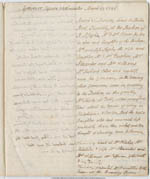
GROSVENOR SQUARE WESTMINSTER MARCH 27. 1786.
March 26. Sunday,
dined in Bolton Street Piccadilly, at the Bishop of St. Asaphs.Mr. and Mrs. Sloper, the Son in Law and Daughter of the Bishop; Mrs. and Miss Shipley the Wife and Daughter; Mr. and Mrs. Vaughan,Mr. Alexander and Mrs. Williams, Mr. Richard Peters and myself, were the Company. In the Evening other Company came in, according to the Fashion, in this Country. Mrs. Shipley at Table asked many Questions about the
Expence of living in Philadelphia and Boston. Said she had a Daughter, who had married, less prudently than they wished, and they thought of sending them to America.
WEDNESDAY [29 MARCH].
Dined at Mr. Blakes. Mr. Middleton and Wife, Mr. Alexander and Mrs. Williams,Mr. Jefferson. Coll. Smith [William Stephens Smith] and my Family.
LONDON THURSDAY MARCH 30.
Presented Mr. Hamilton to the Queen at the Drawing Room.
Page 2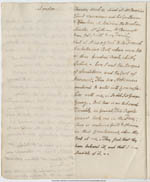
Dined at Mr. Paradices. Count Warranzow
[Woronzow] and his Gentleman and Chaplain, M. Sodorini the Venetian Minister, Mr. Jefferson, Dr. Bancroft, Coll. Smith
[William Stephens Smith] and my Family.
Went at Nine O Clock to the French Ambassadors Ball, where were two or three hundred People, chiefly Ladies. Here I met the Marquis of Landsdown and the Earl of Harcourt. These two Noblemen ventured to enter into Conversation with me. So did Sir George Young [Yonge]. But there is an Aukward Timidity, in General. This People cannot look me in the Face: there is conscious Guilt and Shame in their Countenances, when they look at me. They feel that they have behaved ill, and that I am sensible of it.
Page 3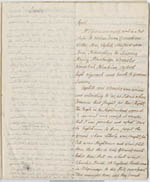
[NOTES ON A TOUR OF ENGLISH COUNTRY SEATS, &C., WITH THOMAS JEFFERSON, 4 - 10? APRIL 1786].
Mr. Jefferson and myself, went in a Post Chaise to Woburn Farm, Caversham,Wotton, Stowe, Edghill, Stratford upon Avon, Birmingham, the Leasowes, Hagley,Stourbridge, Worcester, Woodstock, Blenheim, Oxford, High Wycomb, and back to Grosvenor Square.
Edgehill and Worcester were curious and interesting to us, as Scaenes where Freemen had fought for their Rights. The People in the Neighbourhood, appeared so ignorant and careless at Worcester that I was provoked and asked, "And do Englishmen so soon forget the Ground where Liberty was fought for? Tell your Neighbours and your Children that this is holy Ground, much holier than that on which your Churches stand. All England should come in Pilgrimage to this Hill, once a Year." This animated them, and they seemed [Some of the lines of the original diary are preceded by what appear to be quotation marks. Refer to the page image.]
Page 4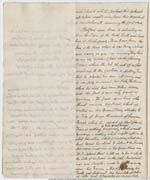
much pleased with it. Perhaps their
Aukwardness before might arise from their Uncertainty of our Sentiments concerning the Civil Wars.
Stratford upon Avon is interesting as it is the Scaene of the Birth, Death and Sepulture of Shakespear. Three Doors from the Inn, is the House where he was born, as small and mean, as you can conceive. They shew Us an old Wooden Chair in the Chimney Corner, where He sat. We cutt off a Chip according to the Custom. A Mulberry Tree that he planted has been cutt down, and is carefully preserved for Sale. The House where he died has been taken down and the Spot is now only Yard or Garden. The Curse upon him who should remove his Bones, which is written on his Grave Stone, alludes to a Pile of some Thousands of human Bones, which lie exposed in that Church. There is nothing preserved of this great Genius which is worth knowing -- nothing which might inform Us what Education, what Company, what Accident turned his Mind to Letters and the Drama. His name is not even on his Grave Stone. An ill sculptured Head is sett up by his Wife, by the Side of his Grave in the Church. But paintings and Sculpture would be thrown away upon his Fame. His Wit, and Fancy, his Taste and Judgment, His Knowledge of Nature, of Life and Character, are immortal.
Page 5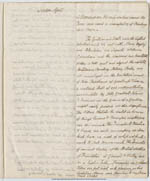
London April
At Birmingham, We only walked round the Town and viewed a manufactory of Paintings upon Paper. --
The Gentlemens Seats were the highest Entertainment, We met with. Stowe,Hagley and Blenheim, are superb. Woburn, Caversham and the Leasowes are beautifull. Wotton is both great and elegant tho neglected. Architecture, Painting, Statuary, Poetry are all employed in the Embellishment of these Residences of Greatness and Luxury. A national Debt of 274 millions sterling accumulated by jobs, Contracts, Salaries and Pensions in the Course of a Century might easily produce all this Magnificence. The Pillars, Obelisks &c. erected in honour of Kings, Queens and Princesses, might procure the means. The Temples to Bacchus and Venus, are quite unnecessary as Mankind have no need of artificial Incitements, to such Amuzements. The Temples of ancient Virtue, of the British Worthies, of Friendship, of Concord and Victory, are in a higher Taste. I mounted Ld. Cobhams Pillar 120 feet high, with pleasure, as his Lordships Name was familiar to me, from Popes Works.
Page 6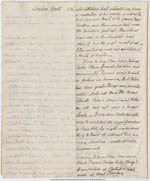
London April 1786
.
Ld. Littletons Seat interested me, from a recollection of his Works, as well as the Grandeur and Beauty of the Scaenes. Popes Pavillion and Thompsons [Thomson's] Seat, made the Excursion poetical. Shenstones Leasowes is the simplest and plainest, but the most rural of all. I saw no Spot so small, that exhibited such a Variety of Beauties.
It will be long, I hope before Ridings, Parks, Pleasure Grounds, Gardens and ornamented Farms grow so much in fashion in America. But Nature has done greater Things and furnished nobler Materials there. The Oceans, Islands, Rivers, Mountains, Valleys are all laid out upon a larger Scale. -- If any Man should hereafter arise, to embellish the rugged Grandeur of Pens Hill, he might make some thing to boast of, although there are many Situations capable of better Improvement.
Since my Return I have been over Black Fryars Bridge to see Viny's Manufacture of Patent Wheels made of bent Timber.
Page 7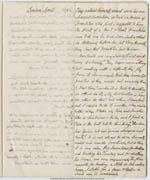
London April 1786.
Viny values himself much upon his mechanical Invention. Is loud in praise of Franklin who first suggested to him the Hint of a bent Wheel. Franklin once told me, he had seen such a Wheel in Holland, before he set Viny to work.Viny says that Franklin said to him, "Mankind are very superficial and very dastardly. They begin upon a Thing but meeting with a difficulty they fly from it, discouraged. But they have Capacities if they would but employ them." "I," says Viny, "make it a Rule to do nothing as others do it. My first Question is how do others do this? and when I have found out, I resolve to do it, another Way, and a better Way. I take my Pipe and Smoke like a Limburners Kiln, and I find a Pipe is the best Aid to thinking." This Man has Genius, but has Genius always as much Vanity? It is not always so open. It is really modest and humble sometimes. But in Viny it is very vain. His Inventions for boiling and bending his Timber, and for drilling his Irons, are very ingenious. The force requisite for bending a Stick of Ash into a hoop, suitable for a large Wheel, or a small one, is prodigious. [Some of the lines of the original diary are preceded buy what appear to be quotation marks. Refer to the page image.]
Page 8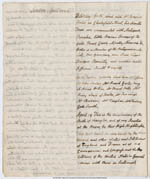
SATURDAY AP. 15.
Dined with Mr. Brand Hollis in Chesterfield Street. His Mantle Trees are ornamented with Antiques. Penates. Little brazen Images of the Gods. Venus, Ceres, Apollo, Minerva &c. Hollis is a Member of the Antiquarian Society. Our Company were Price,Kippis,Bridgen,Romilly, and another besides Jefferson,Smith and myself.
AP. 18 TUESDAY.
Yesterday dined here, Mr. Jefferson, Sir John Sinclair, Mr. Heard, Garter King at Arms,Dr. Price, Mr. Brand Hollis, Mr. Henry Loyd of Boston, Mr. Jennings, Mr. Bridgen, Mr. Vaughan, Mr. Murray,Coll. Smith.
LONDON APRIL 19. 1786. WEDNESDAY.
This is the Anniversary of the Battle of Lexington, and of my Reception at the Hague, by their High Mightinesses. This last Event is considered by the Historians, and other Writers and Politicians of England and France as of no Consequence: and Congress and the Citizens of the United States in General concur with them in Sentiment.
Page 9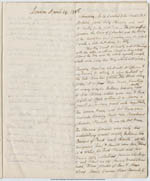
I walked to the Booksellers, Stockdale, Cadel, Dilly, Almon, and met Dr. Priestly for the first Time. -- The Conquest of Canaan, the Vision of Columbus, and the History of the Revolution in S. Carolina, were the Subject. I wrote a Letter to Jn. Luzac, for Dilly.
This Day I met Dr. Priestly and Mr. Jennings, with the latter of whom I had a long Walk. I spent the Day upon the whole agreably enough. Seeds were sown, this Day, which will grow.
LONDON APRIL 20 1786 THURSDAY.
Went with Mr. Jefferson and my Family to Osterly, to view the Seat of the late Banker Child. The House is very large. It is four Three Houses, fronting as many Ways -- between two is a double row of Six Pillars, which you rise to by a flight of Steps. Within is a Square, a Court, a Terrace, paved with large Slate. The Green House and Hot House were curious. Blowing Roses, ripe Strawberries, Cherries, Plumbs &c. in the Hot House. The Pleasure Grounds were only an undulating Gravel Walk, between two Borders of Trees and Shrubs. All the Evergreens, Trees and Shrubbs were here. There is a Water, for Fish Ponds and for Farm Uses, collected from the Springs and wet Places in the farm and neighbourhood. Fine flocks of Deer and Sheep, Wood Doves, Guinea Hens, Peacocks &c.
Page 10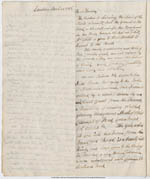
The Verdure is charming, the Music of the Birds pleasant. But the Ground is too level. -- We could not see the Apartments in the House, because We had no Tickett. Mrs. Child is gone to New Markett it seems to the Races.
The beauty, Convenience, and Utility of these Country Seats, are not enjoyed by the owners. They are mere Ostentations of Vanity. Races, Cocking, Gambling draw away their attention.
On our Return We called to see Sion House belonging to the Duke of Northumberland. This Farm is watered, by a rivulet drawn by an artificial Canal from the Thames. A Repetition of winding Walks, gloomy Evergreens, Sheets of Water, Clumps of Trees, Green Houses, Hot Houses &c. The Gate, which lets you into this Farm from the Brentford Road, is a beautifull Thing, and lays open to the View of the Traveller, a very beautifull green Lawn interspersed with Clumps and scattered Trees.
Page 11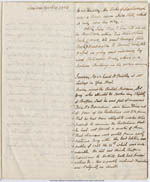
The Duke of Marlborough owns a House upon Sion Hill, which is only over the Way.
Osterly, Sion Place and Sion Hill are all in Brentford, within Ten Miles of Hide Park Corner. We went through Hide Park and Kensington to Brentford. We passed in going and returning, by Lord Hollands House, which is a Modern Building in the gothic manner.
SUNDAY. AP. 23.
Heard Dr. Priestley at Mr. Linseys in Essex Street.
MONDAY [24 APRIL].
Viewed the British Musaeum. Dr. Grey who attended Us spoke very slightly of Buffon. Said "he was full of mauvais Fois. No Dependence upon him. Three out of four of his Quotations not to be found. That he had been obliged to make it his Business to examine the Quotations. That he had not found a quarter of them. That Linnxus was quoted from early Editions long after the last Edition was public of 1766 the 12th, which was inexcuseable. He did not think Buffon superiour to Dr. Hill. Both had Imagination &c. -- This is partly national Prejudice and Malignity, no doubt.
Page 12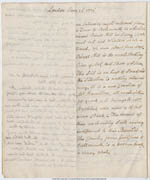
LONDON JUNE 26. 1786.
On Saturday night returned from a Tour to Portsmouth, in which We viewed Paines Hill in Surry, as We went out; and Windsor as We returned. We were absent four days. Paines Hill is the most striking Piece of Art, that I have yet seen. The Soil is an heap of Sand, and the Situation is nothing extraordinary. It is a new Creation of Mr. Hamilton. All made within 35 Years. It belongs to Mr. Hopkins, who rides by it, but never stops. The owners of these enchanting Seats are very indifferent to their Beauties. -- The Country from Guilford to Portsmouth, is a barren heath, a dreary Waste.
Page 13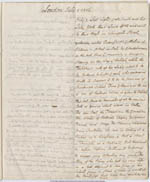
LONDON JULY 1. 1786.
Last night, Coll. Smith and his Lady, took their Leave of Us, and went to their House in Wimpole Street.
Yesterday visited Desenfans's Collection of Pictures. A Port in Italy by Claude Lorraine, is the best Piece that remains. A Sampson sleeping in the Lap of Dalilah, while the Philistines cutt of his Locks, is said to be by Rubens, but Mr. Copely who was present doubts it.
Supposes it to be by some one of Reubens's School. Fine Colours and the Air of one of Reubens's Wives, is given to Dalilah.
This Art shews Us Examples of all the various Sorts of Genius which appear in Poetry. The Epic Poet, the Trajedian, the Comedian, The Writer of Pastorals, Elegies, Epigrams, Farces, and Songs. The Pleasure, which arises from Imitation, We have in looking at a Picture of a Lanscape, a Port, a Street, a Temple, or a Portrait. But there must be Action, Passion, Sentiment and Moral to engage my Attention very much. The Story of the Prince, who lost his own Life in a bold attempt to save some of his Subjects from a flood of Water is worth all the Paintings that have been exhibited this Year.
Page 14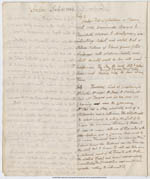
Copleys Fall of Chatham or Pierson, Wests Wolf, Epaminondas, Bayard &c. Trumbulls Warren and Montgomery, are interesting Subjects, and useful. But a Million Pictures of Flours, Game, Cities, Landscapes, with whatever Industry and Skill executed, would be seen with much Indifference. The Sky, the Earth, Hills and Valleys, Rivers and Oceans, Forrests and Groves, Towns and Cities may be seen at any Time.
JULY [6] THURSDAY.
Dined at Clapham, at Mr. Smiths. Dr. Kippis, Dr. Reese, Dr. Harris, Mr. Pais, Mr. Towgood and his two Sons, Mr. Channing and were the Company.
Mr. Pais told a Story, admirably well of a Philosopher, and a Scotsman. The Wit attempted to divert himself, by asking the Scot if he knew the immense Distance to Heaven? It was so many Millions of Diameters of the Solar System, and a Cannon Ball would be so many Thousand Years in running there. I dont know the Distance nor the Time says the Scot, but I know it will not take you a Millionth part of the Time to go to Hell. -- The Scottish Dialect, and Accent was admirably imitated. The Conversation was uniformly agreable. Nothing to interrupt it.
Page 15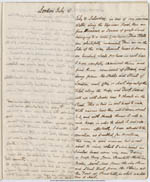
LONDON JULY 8. SATURDAY.
In one of my common Walks, along the Edgeware Road, there are fine Meadows, or Squares of grass Land belonging to a noted Cow keeper. These Plotts are plentifully manured. There are on the Side of the Way, several heaps of Manure, an hundred Loads perhaps in each heap. I have carefully examined them and find them composed of Straw, and dung from the Stables and Streets of London, mud, Clay, or Marl, dug out of the Ditch, along the Hedge, and Turf, Sward cutt up, with Spades, hoes, and shovels in the Road. This is laid in vast heaps to mix. With narrow hoes they cutt it down at each End, and with shovels throw it into a new heap, in order to divide it and mix it more effectually. I have attended to the Operation, as I walked, for some time. This may be good manure, but is not equal to mine, which I composed in similar heaps upon my own Farm, of Horse Dung from Bracketts stable in Boston, Marsh Mud from the sea shore and Street Dust, from the Plain at the Foot of Pens hill, in which is a Mixture of Marl.
Page 16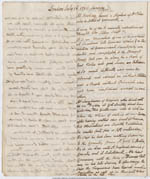
LONDON JULY 16, 1786. SUNDAY.
At Hackney, heard a Nephew of Dr. Price, who is settled at Yarmouth.
It may be of Use to minute miscellaneous Thoughts like Selden, Swift &c.
It is an Observation of one of the profoundest Inquirers into human Affairs, that a Revolution of Government, successfully conducted and compleated, is the strongest Proof, that can be given, by a People of their Virtue and good Sense. An Interprize of so much difficulty can never be planned and carried on without Abilities, and a People without Principle cannot have confidence enough in each other.
Mr. Langbourne of Virginia, who dined with Us on Fryday at Col. Smiths, dined here Yesterday. This Gentleman who is rich, has taken the Whim of walking all over Europe, after having walked over most of America. His Observations are sensible and judicious. He walks forty five or fifty miles a day. He says he has seen nothing superiour to the Country from N. York to Boston. He is in Love with N. England, admires the Country and its Inhabitants. He kept Company with the King of Frances Retinue, in his late journey to Cherbourg. He says the Virginians have learned much in Agriculture as well as in Humanity to their Slaves, in the late War.
Page 17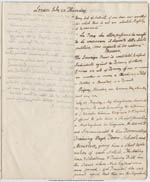
LONDON JULY 20. THURSDAY.
"Every Act of Authority, of one Man over another for which there is not an absolute Necessity, is tyrannical."
"Le Pene the oltre passano la necessita di conservare il deposito della Salute pubblica, sono ingiuste di for natura." Beccaria.
The Sovereign Power is constituted, to defend Individuals against the Tyranny of others. Crimes are acts of Tyranny of one or more on another or more. A Murderer, a Thief, a Robber, a Burglar, is a Tyrant.
Perjury, Slander, are tyranny too, when they hurt any one.
LONDON JULY 21. FRYDAY.
Maj. Langbourne dined with Us again. He was lamenting the difference of Character between Virginia and N. England. I offered to give him a Receipt for making a New England in Virginia. He desired it and I recommended to him Town meetings, Training Days, Town Schools, and Ministers, giving him a short Explanation of each Article. The Meeting house, and Schoolhouse and Training Field are the Scaenes where New England men were formed. Col. Trumbul, who was present agreed, that these are the Ingredients.
Page 18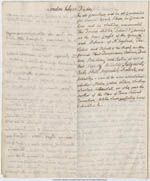
In all Countries, and in all Companies for several Years, I have in Conversation and in Writing, enumerated The Towns, Militia, Schools and Churches as the four Causes of the Grouth and Defence of N. England. The Virtues and Talents of the People are there formed. Their Temperance, Patience, Fortitude, Prudence, and justice, as well as their Sagacity, Knowledge, Judgment, Taste, Skill, Ingenuity, Dexterity, and Industry. -- Can it be now ascertained whether Norton,Cotton,Wilson,Winthrop, Winslow,Saltonstall, or who, was the Author of the Plan of Town Schools, Townships, Militia Laws, Meeting houses and Ministers &c.
Pages 19 - 44
[Blank pages -- no images available]
Inside Back Cover
[Blank page -- no image available]
Back Cover
[Blank page -- no image available]


















